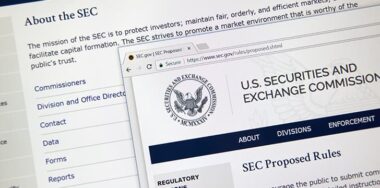| Getting your Trinity Audio player ready... |
U.S. authorities are seeking answers on just how much the crypto-friendly Silvergate Capital Corporation knew about Sam Bankman-Fried’s corrupt crypto empire before its spectacular collapse.
On February 3, Bloomberg reported that the fraud division of the Department of Justice (DOJ) recently began scrutinizing California-based Silvergate Bank for its dealings with SBF’s FTX exchange and its affiliated market-maker Alameda Research. Those dealings go back to 2018, when Alameda opened its first Silvergate account, and continued right up until FTX/Alameda filed for bankruptcy protection last November.
News of the probe isn’t likely sitting well in certain investment circles, including asset manager State Street, which announced Thursday that it had taken a 9.32% stake in Silvergate. Similarly, BlackRock Inc, which previously held a 5.9% stake in Silvergate, revealed last week that it had boosted that stake to 7.2%.
Silvergate shares, which closed Wednesday around $16.25, spiked to nearly $24 on Thursday but slipped back 10% Friday to close at $18.84 and continued to fall in after-hours trading.
Before his comeuppance, SBF publicly celebrated Silvergate and its CEO, Alan Lane, claiming that the bank “revolutionized banking for blockchain companies.” This cozy relationship, which boosted Silvergate’s status and share price, came to a screeching halt in the final quarter of 2022, with Silvergate reporting a net loss of $1 billion and slashing its payroll by 40%.
Silvergate was also hit with a bank run as both retail and institutional customers scrambled to withdraw their cash before anything worse happened. Silvergate recently revealed that over 93% of its current cash on hand was provided by Federal Home Loan Bank (FHLB) advances, a backstop established during the Great Depression to ensure banks could continue to issue mortgages during financial panics.
Prior to FTX’s collapse, Silvergate appeared to tolerate SBF instructing FTX.US’ customers to make deposits to the international FTX exchange via Alameda’s Silvergate account. That subterfuge ensured FTX didn’t lose access to U.S. crypto whales, who found the liquidity on the more tightly scrutinized U.S.-registered FTX.US exchange too shallow for their tastes.
Lane has insisted that Silvergate did proper due diligence on all its crypto clients, but the bank reshuffled its compliance team in the wake of FTX’s implosion. These changes included demoting Tyler Pearson, who was not only Silvergate’s Chief Risk Officer but Lane’s son-in-law.
Show your work
In December, a bipartisan group of U.S. Senators expressed concern that Silvergate “may have failed to implement or maintain an effective anti-money laundering program.” Earlier this week, the same trio—Elizabeth Warren (D-MA), John Kennedy (R-LA), and Roger Marshall (R-KS)—sent a more detailed follow-up questionnaire lamenting Lane’s “evasive and incomplete response” to their December questions.
The senators note that Lane’s previous responses offered ample evidence that Silvergate’s risk management and due diligence processes “did, in fact, fail miserably” due to “extraordinary gaps” in their handling of Silvergate’s crypto clients. The senators also expressed dismay that son-in-law Pearson had not been held “responsible for these failures” and want to know who, if anyone, at Silvergate has been held accountable.
The senators want to know how Silvergate plans to use the $4.3 billion it received in FHLB funds if not for housing loans. The senators note that, in the event of a Silvergate failure, FHLB would be the first vulture in line to feast on its bones. “Such a scenario could leave the [Federal Deposit Insurance Corporation]—and therefore the American taxpayer—holding the bag.”
The senators’ are pleased that Silvergate has begun an internal review of its FTX/Alameda transactions but want to know (a) who’s conducting this review, (b) when it will be finished, (c) what info has been gleaned to date, and (d) will Congress get a “complete and unredacted copy” of Silvergate’s findings. Lane has been given until February 13 to provide “complete answers” to the senators’ original and follow-up questions.
Hear hear(ing)
Meanwhile, the Senate banking committee has scheduled a February 14 hearing on “Crypto Crash: Why Financial System Safeguards are Needed for Digital Assets.” As of now, there’s yet to be a list of those who will offer testimony to the committee. The last hearing in December was notable for the absence of SBF, who was arrested in the Bahamas two days before the hearing. SBF had planned to testify remotely, but it remains to be seen whether SBF will be willing to beam in from his house arrest at his parents’ home in California.
Once the committee is done poking through the crypto ashes, member Tim Scott (R-SC) announced Thursday that his group “should work to facilitate a bipartisan regulatory framework” for digital assets. Scott believes the recent “high-profile failures” of crypto giants (FTX, BlockFi, Celsius, Voyager, etc.) have “resulted in lost consumer assets, exposed regulatory gaps, and highlighted concerns with illicit finance.” Do tell.
Step away from the phone
Meanwhile, the federal judge handling SBF’s criminal trial granted the prosecution’s request to impose new bail conditions on SBF. U.S. District Judge Lewis Kaplan agreed with the prosecution that SBF should no longer have access to encrypted messaging apps to prevent him from contacting former FTX/Alameda execs who may testify against him in court.
The prosecution made the request after discovering that SBF had reached out to Ryne Miller, former general counsel at FTX.US, to suggest that they “use each other as resources when possible, or at least vet things with each other.” SBF is believed to have attempted to contact other former colleagues, in what prosecutors say amounts to witness intimidation and/or coercion.
Kaplan agreed, saying, “there appears to be a material threat of inappropriate contact with prospective witnesses. That risk … is clearly and convincingly sufficient to warrant the imposition of additional conditions.” Kaplan also agreed to prohibit SBF’s contact with former colleagues unless counsel is present or the feds exempt specific individuals from this restriction. SBF’s attorneys will have a chance to argue against Kaplan’s decision on February 9.
EFT DOA
Late Friday, news broke that Emergent Fidelity Technologies (EFT) had filed for Chapter 11 bankruptcy protection. EFT was a company that SBF co-founded with FTX co-founder Gary Wang last spring for the sole purpose of acquiring 56.3 million shares in the digital trading outfit Robinhood (NASDAQ: HOOD). The half-billion or so dollars those shares cost came via a ‘loan’ that Alameda graciously offered SBF, who held a 90% stake in both EFT and Alameda. Convenient, that.
The fight over who owns those shares has been intense, with creditors pointing out that Alameda was effectively insolvent at the time of SBF’s ‘loan,’ meaning those shares were purchased with creditors’ cash. SBF continues to claim without evidence—or shame—that the money he borrowed from Alameda was somehow clean as a whistle, and thus the shares remain his to do with as he likes.
Bankrupt digital asset lender BlockFi is among the creditors making their own claim on the Robinhood shares based on SBF having used the shares as collateral for a $671 million loan BlockFi gave to Alameda shortly before SBF’s roof caved in. The shares are currently in possession of the DoJ, who seized them last month before they could be spirited away by any of the sterling characters in this farce.
The ramifications of EFT’s bankruptcy filing aren’t yet clear, but there’s nothing about this saga that has ever been simple, other than the fact that most crypto bros are irredeemable assholes who should all die screaming.
The obligatory iFinex mention
The group tasked with making sense of SBF’s tangled finances announced this week that the exchange had around $1.4 billion in cash at the close of 2022. That’s about $200 million more than FTX was believed to have had at the end of December. A few weeks ago, the U.S. Bankruptcy Court in Delaware was told that the restructuring team had recovered “over $5 billion” in cash and crypto tokens.
Last week brought reports of the unannounced transfer of around $13 million of various tokens—$6 million of the Tether stablecoin, $4.6 million in the USDC stablecoin, and $2.5 million in ETH—from mostly unidentified sources into a wallet set up to consolidate Alameda’s assets.
The Tether and ETH transfer came via the Bitfinex exchange, which is run by the same group behind Tether. Bitfinex stated that the funds came from an Alameda account on the exchange and that it was “collaborating with the liquidators” overseeing the FTX/Alameda autopsy. (Good thing the Tether portion is over $100,000; otherwise, Tether couldn’t be arsed to redeem those tokens for actual cash backed by actual reserves.)
Crypto Avengers: Civil War
Finally, the dramarama at the heart of FTX’s downfall will soon be committed to celluloid, or at least, digital video. The Hollywood Reporter announced last week that Mark Wahlberg’s production company Unrealistic Ideas has teamed up with Fortune on a documentary focusing on the split between SBF and his onetime business partner, Binance founder Changpeng ‘CZ’ Zhao.
CZ was an early investor in FTX, holding around a one-fifth stake until he refused to disclose the source(s) of his wealth to regulators in which FTX was seeking licenses. FTX forcibly bought out CZ’s stake in 2021, but CZ had the last laugh when his public threat to dump half a billion dollars worth of FTX’s in-house FTT token pushed the already shaky FTX over a cliff.
The filmmakers are promising a “personal examination of the relationship” between CZ/SBF, including their “unique association that positioned them alternately as allies and rivals.” CZ is reportedly cooperating with the project, and while unspecified FTX principals will offer their perspectives, the traditionally verbose SBF doesn’t (yet) appear to have signed on to counter CZ’s version of history.
Guess SBF must be holding out for the return of MTV’s Celebrity Deathmatch. The claymation guys will have a devil of a time recreating that mop of hair, though.
Follow CoinGeek’s Crypto Crime Cartel series, which delves into the stream of groups—from BitMEX to Binance, Bitcoin.com, Blockstream, ShapeShift, Coinbase, Ripple,
Ethereum, FTX and Tether—who have co-opted the digital asset revolution and turned the industry into a minefield for naïve (and even experienced) players in the market.
New to blockchain? Check out CoinGeek’s Blockchain for Beginners section, the ultimate resource guide to learn more about blockchain technology.








